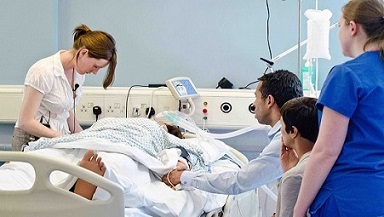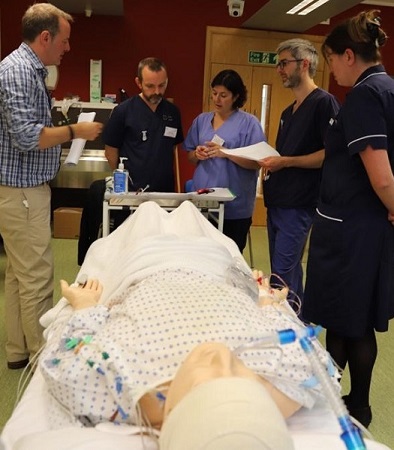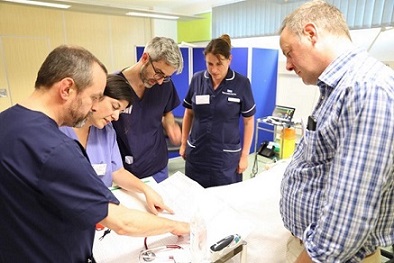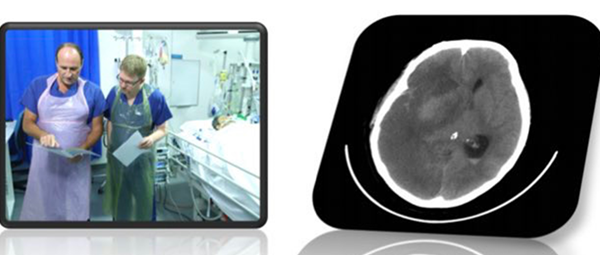The National Deceased Donation Course for Intensive Care Medicine (ICM) Trainees
"One of the best courses I have attended, high quality is mainly driven by the enthusiasm and great knowledge of the faculty members and leads in the subject of organ donation" - Delegate feedback, submitted anonymously
Why do deceased donation simulation?

Deceased donation occurs at times of significant family distress.
It is often not appropriate for junior staff to lead a donation discussion with families. Training in this area is, therefore, not easily facilitated in the clinical arena.
Simulation allows staff training and development in a safe environment whilst enacting real-time events.
The importance of deceased donation simulation
Organ and tissue donation is an important aspect of end-of-life care. In the United Kingdom the General Medical Council establishes a duty of medical practitioners to identify potential organ donors, be prepared to explore the option of deceased donation when a patient is close to death and follow any national donation procedures (GMC Treatment and care towards end of life: good practice in decision making, 2010).
Deceased donation is ethically, legally and emotionally complex. Healthcare professionals can find deceased donation stressful and the shift in focus from one of cure to one of care is a challenge, even to those with many years of experience.
Staff involved in deceased donation require expert levels of knowledge and skills in communication. The Department of Health Organ Donation Taskforce report (2008) recognised this need and made the following recommendation:
"All clinical staff likely to be involved in the treatment of organ donors should receive mandatory training in the principles of donation."


The need for expert knowledge and communication skills is also recognised by the publication of NICE guidance (2011).
The falling incidence of death determined by neurological criteria in the UK means that there are fewer opportunities to witness neurological death testing and subsequent donation care.
Donation following treatment withdrawal presents its own level of ethical, legal, professional and emotional complexity.
The high-fidelity simulation environment is already a proven effective educational tool in intensive care training. Used in non-crisis simulation, such as deceased donation, it is equally valuable.
This national course has been developed with engagement from the Faculty of Intensive Care Medicine (FICM) and the Intensive Care Society (ICS), and covers Domain 8 of the FICM syllabus: End of Life Care.
The content is designed to enable preparations for consultant level working. The number of places should allow each cohort of trainees an opportunity to attend. Any local or regional course you may have attended does not replace this course.
- Free 2-day national course
- Day 1: class room-based learning with a mix of delivery methods
- Day 2: simulation using 8 engaging scenario stations to experience donation practice
- No assessment criteria are used during the course
- Includes accommodation & meals
- Experienced and expert faculty with national leads
- Consistently evaluated as excellent
Course objectives
To develop knowledge and skills within and around:
- Organ donation principles and practice
- Safely diagnosing death
- End of life & family donation discussions
- Withdrawal of life sustaining treatment in DCD
- The capacity to make informed ethical and legal choices in the context of organ donation and wider ICM practice
- The ability to work productively with others, particularly Specialist Nurses
Course dates
2025
- Stirling, 9 and 10 September 2025 - adult spaces available
- London, 18 and 19 November 2025 - fully booked
- Newcastle, 2 and 3 December 2025 -fully booked
2026
- Salford, 17 and 18 March 2026 - adult spaces available
- Stirling, 8 and 9 September 2026 - adult spaces available
- Newcastle, 1 and 2 December 2026 - adult spaces available
If you are interested in attending this course but unable to yet commit to a venue or date then please apply to join our waiting list. In the interest of reducing travel, we encourage attendance at your local centre.
How to apply
This course is suitable for ICM ST level 5 or above. Please state your ST level when contacting us for a course booking form.
Please note that courses with a paediatric element are run in Newcastle, Royal London and Birmingham only.
To apply for any of our course dates or request more information, please email us.

